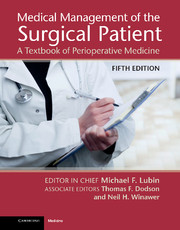Book contents
- Frontmatter
- Dedication
- Contents
- List of Contributors
- Preface
- Introduction
- Part 1 Perioperative Care of the Surgical Patient
- Section 1 General
- Section 2 Cardiology
- Section 3 Hypertension
- Section 4 Pulmonary
- Section 5 Gastroenterology
- Section 6 Hematology
- Section 7 Infectious disease
- Section 8 Renal disease
- Section 9 Endocrinology
- Section 10 Rheumatology
- Section 11 Neurology
- Section 12 Surgery in the Elderly
- Chapter 40 Surgery in the elderly
- Section 13 Obesity
- Section 14 Transplantation
- Section 15 Psychiatric Disorders
- Section 16 Peripartum Patients
- Part 2 Surgical Procedures and their Complications
- Index
- References
Chapter 40 - Surgery in the elderly
from Section 12 - Surgery in the Elderly
Published online by Cambridge University Press: 05 September 2013
- Frontmatter
- Dedication
- Contents
- List of Contributors
- Preface
- Introduction
- Part 1 Perioperative Care of the Surgical Patient
- Section 1 General
- Section 2 Cardiology
- Section 3 Hypertension
- Section 4 Pulmonary
- Section 5 Gastroenterology
- Section 6 Hematology
- Section 7 Infectious disease
- Section 8 Renal disease
- Section 9 Endocrinology
- Section 10 Rheumatology
- Section 11 Neurology
- Section 12 Surgery in the Elderly
- Chapter 40 Surgery in the elderly
- Section 13 Obesity
- Section 14 Transplantation
- Section 15 Psychiatric Disorders
- Section 16 Peripartum Patients
- Part 2 Surgical Procedures and their Complications
- Index
- References
Summary
Introduction
Surgical and anesthetic care have improved markedly in the last half century. It is likely that the greatest benefit of this improvement has been for the elderly population. Older patients can benefit from surgery that would not have been contemplated in the past; thus, patients are living longer and with a better quality of life than ever before.
The literature in surgical care of the elderly patient is extensive and growing rapidly, and indicates that with careful planning and care, the elderly can undergo surgery safely and with approximately the same risk as many younger patients. This section discusses the following topics as they pertain to the elderly population: (a) physiologic decrements of aging; (b) risks of surgery; (c) preoperative evaluation; (d) anesthesia; (e) common surgical procedures; and (f) postoperative care.
Physiologic decrements of aging
Although physicians see many elderly patients who appear old and sick with many underlying health problems, a large percentage of the elderly population is quite well. These people can function entirely normally and have no limitations to their activities. Despite this degree of functional normality, however, all older people experience various decrements in physiologic function that are of importance in planning their care, particularly when they are under stresses such as surgery [1]. These decrements make even healthy older patients more fragile and more likely to suffer postoperative complications and death than their younger counterparts [2–4]. Physicians must take these factors into account in their evaluations.
- Type
- Chapter
- Information
- Medical Management of the Surgical PatientA Textbook of Perioperative Medicine, pp. 425 - 440Publisher: Cambridge University PressPrint publication year: 2013

